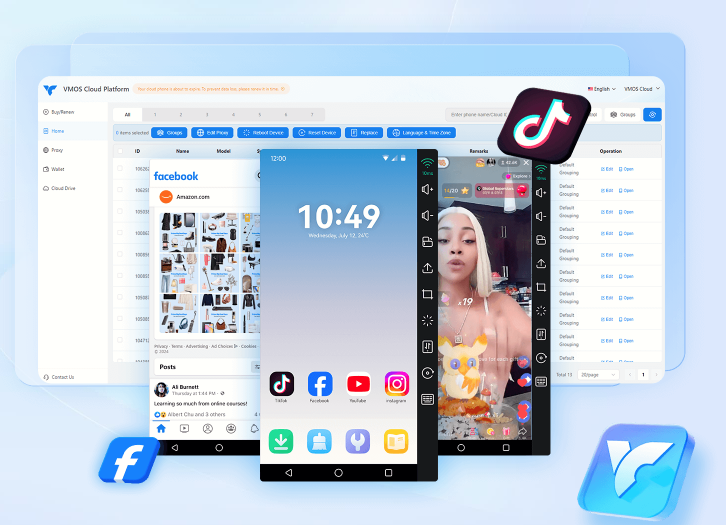“What is a Cloud Phone?” This question may come to mind as your first impression about it. There are also many potential users who cannot distinguish the differences between the Cloud Phones and Emulators clearly, and will feel confused about how to find a suitable solution based on actual needs. So this article will clarify detailed explanations of their key differences on concepts, user cases, as well as share some really to-the-point and useful insights.
Table of Contents
What Are Cloud Phones?
What Are Emulators?
Key Differences Between Cloud Phones and Emulators
Choosing Between Cloud Phones and Emulators
Conclusion
FAQs about VMOS Cloud
What Are Cloud Phones?
Definition of Cloud based Phones
Being one of android emulators, Cloud Phone (aka. android cloud phone) is a service that based on cloud computing technology and ARM-chip. It offers users more smooth performance and stable compatibility than x86-based when creating multiple cloud instances. Let’s say it simply, cloud phone will be more suitable to be described as like building a virtual phone on the cloud platform, not a physical one. This means that all the functionalities you expect from a real phone are available, moreover, without the limitations and inaccuracies in Emulators. Because its ARM hardware equipment guarantees users to gain an experience like operating a real device.
After learning about the concepts of cloud-based phones, perhaps you can scroll down to see what are the target user scenarios for cloud phone.
User Cases for Cloud Phones
Testing and developing Apps: developers or technical people may use it to run different environments of android phones in a sandboxed test. Or make a new version test before app launching. It will efficiently improve the debug work.
Gaming Play: AFK and idle game lovers can play in the background and upgrade levels easily without the worries of account-banned. Users feedback from VMOS Cloud Phone says it efficiently lowers the risks from IP banned and time constraints.
Overseas social media marketing: secure cloud phone manufactures support to create and manage multiple social media accounts at one time. E-commerces or marketing specialists can try its bulk management function to power your brand awareness in FB, Instagram, Tiktok, Shopee and more.
Live Streaming for steamers: many YouTubers or twitch creators are able to use it to increase followers or subscribers quickly. Consider doing an A/B video content test so that you can quickly find your target audience for improving the content creation.
Running Root-Required Apps: use cloud phone android to run apps that require root permissions without rooting your primary device.
What Are Emulators?
Definition of Emulators
Unlike the cloud phones that can run in the cloud, Emulators are software or hardware tools that basically need to be installed on local devices for use. It allows you to simulate another computer system or mobile system (such as operating system, cpu, ram, memory), in such a way, the users can run applications on the specific virtual environment. Usually you should match a virtual box to use together.
User Cases for Emulators
Gaming Multi-instance play: emulators cover the usage of cloud phones android, its users can also operate multiple game accounts including PC games and mobile games.
Software deployment: By configuring different virtual environments manually on emulators, it helps technical people to install software on cloud, and then team members can access softwares quickly through it.
Multiple instances support: emulator users can also enjoy running the multi-instances on the virtual environments, while this is mainly decided by the configuration of the local devices.
Key Differences Between Cloud Phones and Emulators
In the following comparison list, users can easily see their key differences aspects:
Cloud Phone vs. Emulator:
Choosing Between Cloud Phones and Emulators
Given that the basic understanding about their concepts is insufficient to find your best solution. And in the next chapter, it will show the knowledge about the pros and cons of android cloud phones and Emulators.
Benefits and Drawbacks to Use Cloud Phones
Benefits:
Real ARM chips based: users can enjoy highly-performance that is close to that of a real mobile machine, especially suitable for high-load applications or 3D games.
Access all android apps: you can get around the limitations for mobile type cause when downloading apps.
Large-scale multi-instances: it supports operating such as more than 100 instances at the same time, and unified management is also convenient.
Lower IP-banned risk: apps like TikTok may detect the devices running for a healthy social environment. Only a few reliable cloud phone manufactures, which can provide stable ip proxy management and anti-detected solution to power business needs.
Drawbacks:
Online dependency: cloud phones must connect to the internet. If disconnected, the service will be interrupted.
Compatibility: many cloud phones do not support simulating the ios phone system, if you have related needs, please try the official TestFlight or Xcode simulator.
Benefits and Drawbacks to Use Emulators
Benefits:
Low-latency: because of run in the local devices, emulators will get the preferred on scenarios with high real-time requirements.
Offline use: It supports full offline use especially for local development or stand-alone scenarios.
Configuration available: it will be more convenient for developers to flexibly debug the underlying system.
Local multi-instance support: this usually depends on computer performance, and users can run 3-10 instances simultaneously if it works well.
Drawbacks:
CPU/GPU-occupied heavily: it may cause computer lag or be crushed when multiple instances are opened.
Easy to be freezed: emulators may perform performance loss when x86 simulates ARM, especially when it runs some complicated application.
Conclusion
For virtual machine potential users, a detailed guide is essential for building the comprehensive knowledge of cloud phones and emulators. And Try VMOS Cloud today with our free trial will get you ready to achieve high-velocity, cost-effective cloud experience.

FAQ
Why does Android use virtual machines?
Virtual machines can provide user experiences like in real phone devices. If users wanna seek a cost-less solution but can realize the same operating system effects on android, VMOS Cloud Phone can be a first choice to consider.
What kind of Android System does VMOS Cloud support?
Now VMOS Cloud Phone supports android 10, android 13, and android 14.


